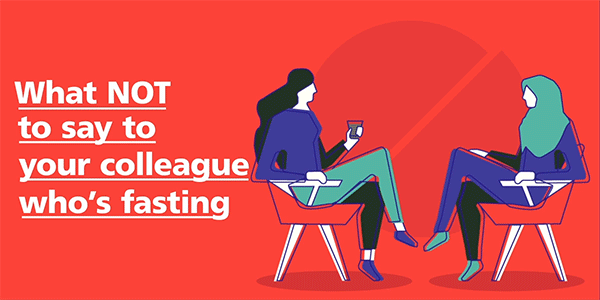
With companies championing diversity more than ever, it’s important to note that diversity is a brilliant thing when it’s not just a buzzword. It’s easy to assume the problem of ignorance and prejudice is solved, however many minorities deal with microaggressions multiple times a day. Diversity is a structural solution, not a superficial one.
When we take time to understand other people’s cultures and beliefs and respect them – we really do grow as human beings. It allows us to fulfill a basic human need – connection.
In the spirit of connection and Ramadan, we thought we’d put together a code of conduct for anyone that isn’t sure what to say to any of their coworkers that might be observing Ramadan.
Just a bit of background…
Ramadan is an Islamic month, which lasts around 28/29 days. The Islamic months operate on a lunar calendar, known as the Hijri calendar. This is why Ramadan starts and ends at different times each year. During Ramadan, Muslims fast during sunlight hours. The day after Ramadan is Eid-ul-Fitr. Families and friends come together and enjoy great food and presents and just general feel-good community togetherness. Surprisingly, Eid can often feel bittersweet because, even though Ramadan can be a challenge – we miss it a lot when it’s gone!
So, if you’re not observing Ramadan but someone at work is, here’s a few stock phrases you might want to steer clear of:
1. Not even water?
This one isn’t too bad but it is one that I have to clarify pretty much every year. Fasting means no food and no drink! Some are exempt from fasting, but unless you are ill, pregnant, elderly or menstruating – then yes, not even water.
2. How can you do that to your body?
“How long does Ramadan go on for? 30 days?! You’re gonna die man! Hey guys, Zahrah’s not gonna eat or drink for thirty days! Thirty days!”
Well, we don’t fast continuously for thirty days, we eat and drink every day in fact, just not during sunlight hours. The simple reason is because it is part of our religion and one of the five pillars of Islam. But, as we know, Muslims aren’t a homogenous group and everyone finds different benefits from fasting. For some, it increases your spirituality and makes you feel closer to God, for others, it helps you to empathise with the poor and inevitably makes you more charitable. It can even make you healthier and more productive!
3. It must be ridiculously hard
Look, empathy is great, but this isn’t really an empathetic comment here is it? Fasting can definitely be hard, especially during the hot summer months, when the days are long. Your body goes through a lot. To get through it, we live life as close to normal as possible. Going to work or school or running errands makes the day go faster, and you usually get more done. Not eating or drinking can weirdly make you more productive. However, comments focusing on how hard it is, can often make us feel how hard it is – we were keeping busy and you brought it up! Now we’re hungry again, thanks a bunch.
Just kidding, we know this phrase is often well meant, so no one will bite your head off for it – unless we’re really hungry.
4. I could never do that
Well that is honest and fair enough, but we didn’t ask you to, did we?
Sometimes this can be said out of respect and admiration – and we can usually tell. But we’d be lying if we said it was always easy for us. When we wake up to eat – the thought that the day ahead will be hard crosses our minds. When we see the weather forecast of how sunny it will be – yeah, we do dread the thirst. But we do it anyway. Because Ramadan isn’t just about not eating, it tests our patience and endurance.
5. It sounds absurd
This is the only one that irks me, because it is rude. And rudeness is just anti-British.
2 billion people across the world choosing not to eat, to give charitably and to practice kindness and perseverance for an entire month whilst praying 5 times a day in the same direction can, of course, be seen as absurd by today’s standard. The sense of unity and self-control isn’t something we see often.
You know how we could solve the problem of privilege? If those in positions of power could stop considering their upbringing and culture, the norm. If we could get past seeing the world through a lens of White, Male, Western patriarchy – it would change a whole lot. (Note: this is the long solution, so it will take time, the short solution is to listen to this article.)
6. Anything that others
Most working Muslims, fasting in the UK, have more in common with our peers than not. We’ve been to the same schools, after-school clubs, universities, spoken the same slang and practice the exact same passive aggressive Britishness of shaking our heads and mouthing ‘unbelievable’ when someone pushes past us on the tube.
We have more in common than that divides us. So comments that express emotions other than curiosity and genuine interest, aren’t needed.
For the record, I have personally worked with truly supportive colleagues who have been nothing but understanding and considerate (Shout out Go Think Big & NYA!) however for some, Ramadan can be a rough time if you’re surrounded by people who choose to do the opposite.
We spend a lot of our lives at work, so let’s use that time to understand one another and foster our own sense of community and make our workplaces a better place to be.
NOTE: I don’t speak for all Muslims, so this is a basic guide, but why not discuss what your Muslim colleague is OK with? It’s even fine to have banter if that’s what your relationship is like; we all have a sense of humour too!
